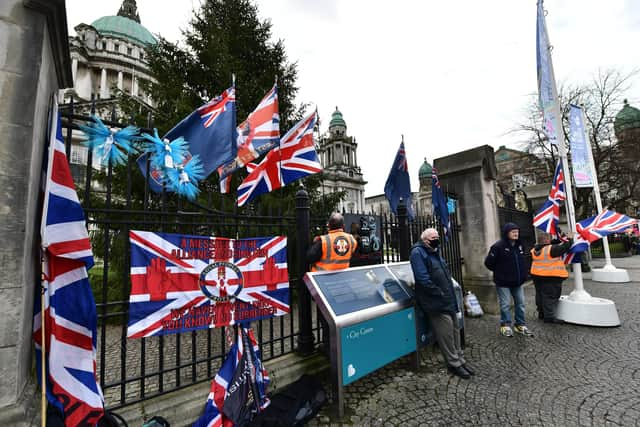Flag protests 10 years later: Unionist views have ‘hardened’, says loyalist campaigner Jamie Bryson
and live on Freeview channel 276
Jamie Bryson, who took a leading role in the campaign against Belfast City Council's decision in December 2012 to limit the number of days the flag flies from the city hall, was speaking to the News Letter ahead of the 10th anniversary of the protests erupting.
Mr Bryson, who in 2015 was found guilty of taking part in unlawful public processions linked to the protests, said the movement had “awakened” unionism and loyalism and hardened views.
Advertisement
Hide AdAdvertisement
Hide Ad“If people cast their mind back to 2012, the vast majority of unionism and loyalism was pro-agreement, it was supportive of the institutions, and it was in a bit of a slumber,” he said.


“The views that the likes of myself, Willie Frazer and Jim Allister would have articulated were a minority of a minority.
"Fast forward 10 years, and now I would say the majority – the vast majority – of unionism and loyalism has set their face against the agreement, and has accepted that power-sharing is fundamentally imbalanced.
“I think you can trace the first tremors of that back to the flag protest, right the way through.”
Advertisement
Hide AdAdvertisement
Hide AdHe continued: “There are nuances in this, because if you look at the DUP’s seven key tests [on the Northern Ireland Protocol and their refusal to re-enter power-sharing government at Stormont until its concerns are addressed], the seventh one relates to Northern Ireland’s constitutional guarantee, the principle of consent, so the fundamental basis for unionism’s consent for the agreement has been eroded by the protocol.
“If the sole basis for the agreement is removed, on what basis can you argue for it? I think the DUP are pro-devolution, they are pro-power-sharing, but in a fair and balanced way. I think everybody now accepts the current structures aren’t fair and balanced.”
He added: “I think the Orange Order’s Mervyn Gibson, in the field on July 12, 2013, said that the Union Flag protests had awakened unionism and loyalism from its slumber.
"I think that’s what it did. People had finally had enough, it was the straw that broke the camel’s back.
Advertisement
Hide AdAdvertisement
Hide Ad"It was highly symbolic and I think since then, there has been a constant hardening of unionism and loyalism’s views.
"The leader of the DUP has said ‘enough is enough’ and people agree with that view.
“It played a fundamental role in awakening people and providing a more fertile ground for the views articulated by those of us who do feel that the entire system is weighted against the unionist and loyalist community.”
The flag protests, which spread from Belfast and were replicated in towns across Northern Ireland, also led to violent clashes between protestors and police.
Advertisement
Hide AdAdvertisement
Hide AdAsked to address the violence and disorder that sometimes accompanied the flag protests, Mr Bryson said: “I always encourage peaceful protest, but there were significant issues as regards to how that was policed.”